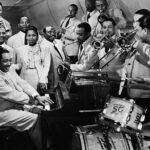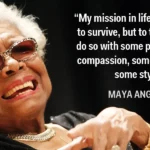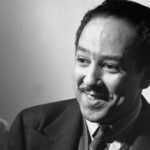Maya Angelou: A Symphony of Words and Wisdom in the Tapestry of Black History
Maya Angelou, a luminary of literature and a tireless advocate for civil rights, embarked on a journey that left an indelible mark on black history. From her early years in St. Louis, Missouri, to becoming a renowned poet, author, and influential figure in the Civil Rights Movement, Maya Angelou’s life is a narrative of resilience, creativity, and profound insight. In this comprehensive biography, we explore the life of Maya Angelou, delving into her family, education, achievements, and the lasting impact she made on black history.
Early Life and Family:
Maya Angelou was born Marguerite Annie Johnson on April 4, 1928, in St. Louis, Missouri. Raised by her grandmother in Stamps, Arkansas, Maya’s early years were shaped by the racial segregation and challenges of the Jim Crow era. The close bonds of her family and the stories of her childhood laid the foundation for her unwavering spirit.
Early Trauma and Transformation:
At the age of seven, Maya experienced a traumatic incident that left her mute for several years. During this period of silence, she discovered the transformative power of literature, immersing herself in books and poetry. This love for language and storytelling would become a hallmark of her future endeavors.
Education Against Adversity:
Maya Angelou pursued education with determination, overcoming the obstacles faced by a young black woman in mid-20th century America. She attended George Washington High School in San Francisco and furthered her studies in dance and drama at the California Labor School. Her passion for learning and artistic expression laid the groundwork for her remarkable journey.
Family and Personal Life:
Maya Angelou married Tosh Angelos in 1951, and their marriage ended in divorce. She later married Paul du Feu, and this union also faced separation. Angelou was the mother of one son, Guy Johnson. Her experiences as a mother, wife, and single woman provided rich material for her literary works.
Achievements and Contributions:
1. Literary Luminary:
Maya Angelou’s literary achievements are crowned by her groundbreaking autobiography, “I Know Why the Caged Bird Sings.” This memoir made history as the first nonfiction bestseller by an African American woman.
2. Poet Laureate:
Angelou’s poetic brilliance earned her the title of Poet Laureate of the United States, making her the first African American woman to hold this esteemed position.
3. Prolific Author:
Beyond her autobiography, Angelou penned numerous essays, poems, and plays. Each work bore the distinct mark of her unique voice and perspective.
4. Civil Rights Activist:
Inspired by the Civil Rights Movement, Angelou used her literary prowess and platform to advocate for social justice, equality, and the empowerment of marginalized communities.
5. Renaissance Woman:
Maya Angelou’s talents extended beyond literature to include singing, dancing, and acting. Her multifaceted creativity earned her the title of a true Renaissance woman.
Legacy:
Maya Angelou’s legacy is interwoven with the fabric of black history, celebrating her contributions to literature, civil rights, and the arts. Her impact endures in the following ways:
1. Literary Icon:
Maya Angelou is celebrated as a literary icon, with her works continuing to inspire readers globally.
2. Civil Rights Advocate:
Her commitment to civil rights and equality positions her as a revered figure in the ongoing struggle for justice.
3. Role Model for Resilience:
Angelou’s personal journey, marked by resilience and triumph over adversity, serves as a testament to the strength of the human spirit.
Top 20 Most Asked Questions About Maya Angelou:
1. When and where was Maya Angelou born?
Maya Angelou was born on April 4, 1928, in St. Louis, Missouri.
2. What was Maya Angelou’s birth name?
She was born Marguerite Annie Johnson.
3. What was the traumatic incident in Angelou’s childhood?
At the age of seven, Angelou was sexually assaulted by her mother’s boyfriend, leading to a period of voluntary silence.
4. How did Angelou become involved in the Civil Rights Movement?
Angelou’s experiences with racism and injustice fueled her passion for civil rights, and she worked alongside leaders like Martin Luther King Jr. and Malcolm X.
5. What is Angelou’s most famous work?
“I Know Why the Caged Bird Sings” is her most famous autobiography, earning critical acclaim and international recognition.
6. How did Angelou’s early trauma shape her writing?
Her early trauma, documented in her autobiographies, became a central theme in her literary works, emphasizing resilience and self-discovery.
7. How many autobiographies did Angelou write?
She wrote seven autobiographies, each providing a unique perspective on her life.
8. What is the significance of the title “I Know Why the Caged Bird Sings”?
The title is a metaphor expressing the longing for freedom and the impact of racial oppression.
9. Was Angelou involved in the arts beyond writing?
Yes, Angelou was a singer, dancer, and actress, showcasing her diverse talents.
10. What is Angelou’s famous poem about resilience?
“Still I Rise” is a powerful poem that celebrates resilience and triumph over adversity.
11. Did Maya Angelou win any awards?
She received numerous awards, including the Presidential Medal of Freedom and three Grammy Awards for her spoken-word albums.
12. What is Maya Angelou’s connection to Oprah Winfrey?
Oprah Winfrey considers Maya Angelou a mentor and close friend, with Angelou providing guidance and inspiration.
13. Did Angelou have children?
Yes, Maya Angelou had one son, Guy Johnson, who is a poet and author.
14. What inspired Angelou to write her autobiographies?
James Baldwin, a close friend of Angelou, encouraged her to write about her life experiences, leading to the creation of her autobiographical works.
15. Where is Maya Angelou buried?
She is buried at the Wake Forest University campus in Winston-Salem, North Carolina.
16. How did Maya Angelou contribute to education?
Angelou held several teaching positions at universities, including Wake Forest University, and received honorary degrees for her contributions to literature and education.
17. What themes did Angelou explore in her poetry?
Her poetry explored themes of love, resilience, social justice, and the African American experience.
18. Did Angelou speak multiple languages?
Angelou was proficient in several languages, including French, Spanish, Italian, and Fante.
19. What impact did Angelou have on American literature?
Her impact on American literature is profound, breaking barriers for African American women writers and influencing generations of authors.
20. How did Maya Angelou pass away?
Maya Angelou passed away on May 28, 2014, at the age of 86.
Conclusion:
Maya Angelou’s life, a symphony of words and wisdom, continues to resonate as an enduring testament to the power of resilience, creativity, and social activism. Through her literary works, civil rights advocacy, and multifaceted talents, she not only shaped the trajectory of black history but also left an indelible impact on the broader cultural landscape. As we reflect on the extraordinary life of Maya Angelou, we find inspiration in her unwavering commitment to freedom, education, and the relentless pursuit of equality.




